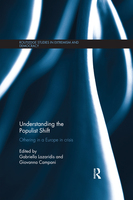-

Publisher's description:
As Europe enters a significant phase of re-integration of East and West, it faces an increasing problem with the rise of far-right political parties. Cas Mudde offers the first comprehensive and truly pan-European study of populist radical right parties in Europe. He focuses on the parties themselves, discussing them both as dependent and independent variables. Based upon a wealth of primary and secondary literature, this book offers critical and original insights into three major aspects of European populist radical right parties: concepts and classifications; themes and issues; and explanations for electoral failures and successes. It concludes with a discussion of the impact of radical right parties on European democracies, and vice versa, and offers suggestions for future research.
-

Publisher's description:
During the European elections of 2014, one of the main issues raised by the media was the electoral performance of so called ‘populist parties’. The electorate confirmed its deep dissatisfaction with mainstream political parties, voting for far right parties in parliamentary elections in Northern Europe (Austria, Denmark, Sweden), Eastern Europe (Hungary, where the deeply anti-Semitic Jobbik party gained votes) and in France (where the French National Front won about a quarter of the vote), while in the Southern European countries, battered by austerity policies, it was the radical right and left in Greece (Golden Dawn and Syriza) and the radical left in Spain (Podemos) that obtained excellent scores.
This book examines the growing trend towards far and extreme right populism that has emerged prominently in Northern (Finland), Western (Austria, Denmark, France, the UK), Southern (Greece, Italy) and Central/Eastern Europe (Slovenia, Bulgaria) since the 1990s. Providing a critical understanding of current European trends and analysing the complex phenomena covered by the notion of populism, this book will be of interest to students and scholars researching right-wing politics, as well as European politics more generally.
-

-

Publisher's description:
This updated edition of Populism in Latin America discusses new developments in populism as a political phenomenon and the emergence of new populist political figures in Mexico, Argentina, and Venezuela in particular.
-

Publisher's description:
In the first half of the twentieth century, classic populist leaders like the Peróns in Argentina and Vargas in Brazil sought to create direct, personal ties between themselves and their followers. At the same time, they incorporated large numbers of previously excluded people into the body politic. The resurgence of democracy in Latin America in the 1980s and 1990s brought with it two new waves of populism: first, the neopopulism of leaders like Salinas in Mexico and Fujimori in Peru, who promoted neoliberal solutions to the economic problems of the 1990s; and second, the radical populism of leaders like Chávez in Venezuela and Morales in Bolivia, who repudiated neoliberal policies in favor of some form of socialism in what has come to be called “the pink tide.”
Many have studied populist movements, for they offer fascinating insights into Latin American history and politics. But until now there have been no book-length studies of the relationship between gender and populism throughout the region. The essays in Gender and Populism in Latin America analyze the role of masculinity and femininity in the political careers of figures ranging from Evita Perón to Hugo Chávez, considering the relationships among populism, democracy, authoritarianism, and feminism in Argentina, Bolivia, Brazil, Ecuador, Mexico, Nicaragua, Peru, and Venezuela.
In addition to the editor, the contributors are Michael Conniff, Gioconda Espina, Sujatha Fernandes, Victoria González-Rivera, Karin Grammático, Jocelyn Olcott, Cathy A. Rakowski, Stéphanie Rousseau, Ximena Sosa-Buchholz, and Joel Wolfe. The Foreword is by Kurt Weyland.
-

Publisher's description:
For the People offers a new interpretation of populist political movements from the Revolution to the eve of the Civil War and roots them in the disconnect between the theory of rule by the people and the reality of rule by elected representatives. Ron Formisano seeks to rescue populist movements from the distortions of contemporary opponents as well as the misunderstandings of later historians.
From the Anti-Federalists to the Know-Nothings, Formisano traces the movements chronologically, contextualizing them and demonstrating the progression of ideas and movements. Although American populist movements have typically been categorized as either progressive or reactionary, left-leaning or right-leaning, Formisano argues that most populist movements exhibit liberal and illiberal tendencies simultaneously. Gendered notions of "manhood" are an enduring feature, yet women have been intimately involved in nearly every populist insurgency. By considering these movements together, Formisano identifies commonalities that belie the pattern of historical polarization and bring populist movements from the margins to the core of American history.
-

Publisher's description:
In The Populist Persuasion, the distinguished historian Michael Kazin guides readers through the expressions of conflict between powerful elites and "the people" that have run through our civic life, filling it with discord and meaning from the birth of the United States until the present day. Kazin argues persuasively that the power of populism lies in its adaptable nature. Across the political spectrum, commentators paste the label on forces and individuals who really have just one big thing in common: they are effective at blasting "elites" or "the establishment" for harming the interests and betraying the ideals of "the people" in nations that are committed, at least officially, to democratic principles. Kazin's classic book has influenced debates over populism since its publication. The new preface to this edition brings the story up to date by charting the present resurgence of populist discourse, which was front and center in the 2016 elections and in the Brexit debate.
-

The recent resurgence of populist movements and parties has led to a revival of scholarly interest in populism. This volume brings together well-established and new scholars to reassess the subject and combine historical and theoretical perspectives to shed new light on the history of the subject, as well as enriching contemporary discussions.
In three parts, the contributors explore the history of populism in different regions, theories of populism and recent populist movements. Taken together, the contributions included in this book represent the most comprehensive and wide-ranging study of the topic to date. Questions addressed include:
- What are the 'essential' characteristics of populism?
- Is it important to distinguish between left- and right-wing populism?
- How can the transformation of populist movements be explained?







